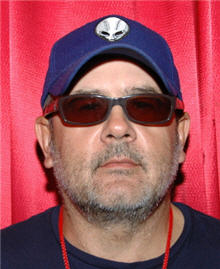Singularity Summit 2007: On the machinations of the beautiful mind

Guest post: This weekend I am at the Singularity Summit 2007 in San Francisco at the Palace of Fine Arts. About 800 people showed up to hear about the issues related to a future in which humans won't be the driving force in delivering scientific and technological innovations, eclipsed cognitively by "posthumans" or machine intelligences. I talked to four of the speakers prior to the event--the podcasts are here.

Prior to the event, Chris pondered the artificially intelligent future...
With every day that goes by, our relationships with machines becomes more and more intimate.
It all started, I think, when people began to fall in love with their cars. They would stroke them, wash them, give them names.
“ Shall we take Mildred or Henry?” a wife might say to her husband. And they wouldn’t have even set out for the orgy at the Entwhistles’ house.
It got worse the more personal machines became. The Walkman became a much-fingered item on public transport. The CD player also.
Then along came Jobs and we were confronted with a whole brand dedicated to machine-love. Amadeus Ex Machina.
Computers suddenly had personalities. And quirks. “Oh, look! My Mac has turned itself off again. Must have had a bad day at the office, poor thing.”
Ordinary day-to-day workhorse machines suddenly became worthy of high affection.
So while every head assembled here in the Singularity Summit is pounding with ponderment and worrying till its brows are one large furrow, on the concept of machines that are smarter than humans, there is an aspect of the man/machine relationship that has perhaps been overlooked.
We have come to enjoy so much affection for machines that, as the 20th Century staggered panting over the line and handed over its sweaty baton to the 21st, we have been trying to make ourselves more like machines.
We’re trying to work harder, to work longer, to make fewer and fewer mistakes. Or we’ll be fired. (Governments are, as yet, exempt from this rule.)
We’re spending much of our time finding the perfect humanoid machine to be our life-partner and when that machine begins to show a little wear and tear, we go out and buy another one. (Literally, in the case of some men at this conference.)
And we’re littering our bodies with more and more chemical substances so that we can more closely resemble the machines that we love: our Ferraris (cocaine), our SUVs (steroids) and our Dell laptops (Four Jack Daniels washed down with three pints of real ale, a Bacardi chaser and a couple of rohypnol)
Surely, then, the ultimate goal of Professor Eliezer Yudkowsky, Barney Pell, Ray Kurzweil and all their who sail in their starship of enterprise, should be to create lovable machines that preserve more of the essences of humanity. Because humanity needs to preserve some of its own essences. Or, perhaps, as these erudite speakers are asking today, it doesn’t.
Perhaps they will feel that this is the perfect opportunity to dump many, or even most, human principles.
It is in these people’s hands to decide whether the greatest challenge will not be to get a robot to walk and to talk, but to get it to tell an absurd joke, to tell a tall tale or to sing off key in a public place.
This point has occasionally been made in movies. But the reality is surely even more vexing.
Even if the robot created has a serious purpose, even if it should be armed with enough code to correct its own mistakes and improve itself faster than Tony Robbins after a Tony Robbins three-day convention, should it also have failings? Not ones that make it work badly (there again…), but ones that enhance its terms of endearment.
Otherwise, the machine-like human drive for perfection, killing us as it is already (except in San Francisco, where the word ‘perfection’ is still superceded by the word ‘whatever’) might make life duller than a Menlo Park cubicle on a Monday morning.
Isn’t it the responsibility of all the vast and vivid minds assembled at this Summit to create a place, a space, where humanity and machinery can enjoy a common goal?
Perhaps at the Entwhistles’ house.